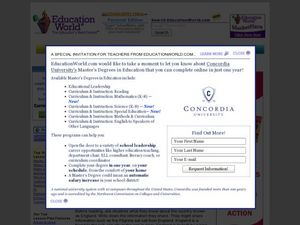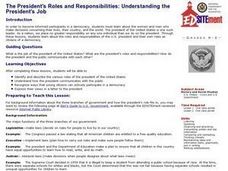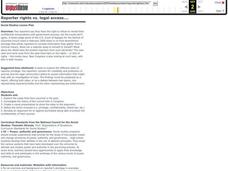Curated OER
British Royalty Tours the U.S.
Students share their knowledge of England, then read a news article about Prince Charles's anticipated visit to the U.S. In this current events lesson (written prior to Prince Charles's visit), the teacher introduces the article with a...
National Endowment for the Humanities
The "To Do List" of the Continental Congress
What is on your to-do list today? The second lesson of a three-part series on Lost Heroes of America investigates the laundry list of items in front of the second Continental Congress. Scholars research, analyze, and present information...
Curated OER
The U. S. at War
Students examine reasons for going to war. In this foreign policy lesson, students analyze the reasons the U.S. entered the the War of 1812, the Mexican War, the Spanish-American War, World War I, World War II, the Korean War, the...
Curated OER
Why Does Congress Work That Way?
Young scholars discover the powers of Congress. In this legislative branch lesson, students examine the legislative process as they analyze Article I of the U.S. Constitution. Young scholars consider the powers of Congress as they define...
Curated OER
Benjamin Franklin and the U.S. Constitution
Students explore U.S. history by completing a quiz about civics. In this Benjamin Franklin lesson, students read assigned text about Franklin's role in the development of the Constitution and the creation of a new society. Students...
Carolina K-12
African Americans in the United States Congress During Reconstruction
The Civil Rights Act of 1866, which granted citizenship to all males in the U.S., resulted in the first African Americans to be elected to Congress. Class members research 11 of these men, the challenges they faced, and craft...
Curated OER
Teaching With Documents: U.S. Constitution Workshop
What does it mean to be American? Explore the constitution and what it really means to be a citizen here. First, learners of all ages will investigate different primary source documents. Then, they establish each document's...
American Bar Association
What Is Separation of Powers?
Who has the power? Scholars investigate the creation of the three branches of government in the United States Constitution. They analyze just why the framers created the branches the way they did.
Curated OER
Launching the New U.S. Navy
Students analyze the U.S. Constitution for references to the creation and management of the U.S. Navy. They discuss their research and complete a worksheet and then research how the current Navy is organized.
Curated OER
The President's Roles and Responsibilities: Understanding the President's Job
Learners examine the roles and responsibilites of the president of the U.S. They identify and discuss the three branches of U.S. government, view and discuss a White House Photo essay online, and create a class book entitled, 'If I Were...
Curated OER
Structure of Congress
Students examine the structure of Congress. They identify the roles of the Democratic and Republician parties and their leaders. They role play the role of congressmen and pretend to pass new legislation.
Curated OER
It's in Your Pocket
Students examine American coins. In this American currency lesson, students study how American money came to be as well as the responsibilities of the U.S. Mint. Students discover details regarding American coins and design their own coins.
Curated OER
The Role of the Executive Branch in the Lawmaking Process
Students examine Article I, Section 7, and Article II, Sections 2 and 3, of the U.S. Constitution, explain the president's role in the lawmaking process, and define the term veto.
Judicial Learning Center
The U.S. Supreme Court
How do Supreme Court justices determine which cases to consider? What happens when the Supreme Court decides not to take a case? The lesson explores important questions and others in the field of criminology. It focuses on the appeals...
Curated OER
Launching the New U.S. Navy
Students analyze United States Constitution, locate general references to common defense, and specific references in document to U.S. Navy. Students then respond to questions on Document Analysis Worksheet, and discuss relationship...
Curated OER
Abraham Lincoln and the U.S. Constitution
Students investigate President Abraham Lincoln's use of the U.S. Constitution and its importance to the Civil War. In this US history activity, students read text about President Lincoln and the US Constitution. Students examine the...
Curated OER
Documents and Symbols and American Freedom
Young scholars complete a unit of lessons on the documents, symbols, and famous people involved in the founding of the U.S. government. They create a personal bill of rights, write a found poem, design a flag, conduct research, and...
Curated OER
The Three Branches of Government
Sixth graders discover details about the 3 branches of government. In this primary source analysis lesson, 6th graders examine documents and images from the Library of Congress to investigate the structure of the U.S. government.
Judicial Learning Center
The Power of Judicial Review
Marbury v. Madison is arguably the most important landmark case in the history of the Supreme Court. A fact-filled lesson provides background information about the case and two others related to the concept of judicial review. Scholars...
National Endowment for the Humanities
Lesson 4 James Madison: Internal Improvements Balancing Act—Federal/State and Executive/Legislative
Who has the power? The founding fathers asked the same question when the United States was formed. Learners explore issues that arose during Madison’s presidency that raised constitutional questions. Through discovery, discussion, and...
Curated OER
Nuclear Power Gets A Boost
Students examine nuclear plants and how they use fission reactions to generate electricity, compare fusion reactions to fission, and read about technology that may soon allow fusion to become practical for producing nuclear power...
Curated OER
Reporter Rights vs. Legal Access...
High schoolers explore cases that have occurred in the past in which reporters refuse to reveal their confidential conversations with government sources and investigate the status of the current bills in Congress. Students use this...
Curated OER
George Washington: The Precedent President
Students investigate precedents set during George Washington's term in office. They conduct Internet research, develop a list of the responsibilities of the President, match Washington's accomplishments with the list, and play a game.
Curated OER
Lincoln's Spot Resolutions
Learners take a closer look at historical relations between the United States and Mexico. In this Texas annexation lesson, students examine primary documents authored by Zachary Taylor, James Polk, and Abraham Lincoln to consider why the...

























